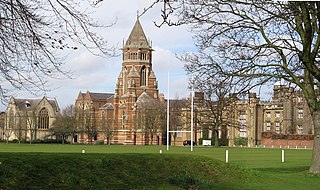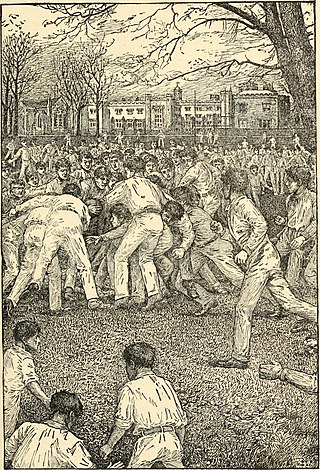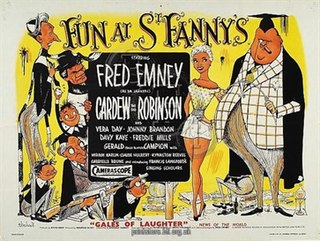
Rugby School is a public school in Rugby, Warwickshire, England.

Tom Brown's School Days is a novel by Thomas Hughes, published in 1857. The story is set in the 1830s at Rugby School, an English public school. Hughes attended Rugby School from 1834 to 1842.

Nigel Molesworth is a fictional character, the supposed author of a series of books about life in an English prep school named St Custard's. The books were written by Geoffrey Willans, with cartoon illustrations by Ronald Searle.

The Liverpool Institute High School for Boys was an all-boys grammar school in the English port city of Liverpool.

Ashville College is a co-educational independent school for both day and boarding pupils aged 2–18 in Harrogate, North Yorkshire, England.

Founded by King Henry VIII in 1541, The King's School is a state-funded Church of England Cathedral Chorister School located in Peterborough, England. It is the Chorister School for Peterborough Cathedral. Former pupils are known as Old Petriburgians.

Northampton School for Boys (NSB) is an 11–18 boys secondary school in Northampton, England. It was founded as Northampton Grammar School in 1541 by Thomas Chipsey, Mayor of Northampton. Years 7 to 11 are boys-only, while sixth form classes are mixed. The school generally ranks among the best-performing in the county.
William Ellis School is a voluntary aided secondary school and sixth form for boys located in Gospel Oak, London, England.

Queen Elizabeth Grammar School (QEGS) is a public school for boys in Wakefield, West Yorkshire, England. The school was founded by Royal Charter of Queen Elizabeth I in 1591 at the request of leading citizens in Wakefield 75 in total and some of whom formed the first governing body.

The school story is a fiction genre centring on older pre-adolescent and adolescent school life, at its most popular in the first half of the twentieth century. While examples do exist in other countries, it is most commonly set in English boarding schools and mostly written in girls' and boys' subgenres, reflecting the single-sex education typical until the 1950s. It focuses largely on friendship, honour and loyalty between pupils. Plots involving sports events, bullies, secrets, rivalry and bravery are often used to shape the school story.

Bishop's Stortford College is a private boarding and day school in the English public school tradition for more than 1,200 pupils aged 4–18, situated in a 130-acre (0.53 km2) campus on the edge of the market town of Bishop's Stortford, Hertfordshire, England.

Eastbourne College is a co-educational fee-charging school in the English public school tradition, for boarding and day pupils aged 13–18, in the town of Eastbourne on the south coast of England. The College's headmaster is Tom Lawson.
Humphry Francis Ellis was an English comic writer. He created A. J. Wentworth, the ineffectual schoolmaster whose fictional diaries were first published in the magazine Punch.

Tom Brown's Schooldays is a 2005 British television film directed by Dave Moore and starring Alex Pettyfer and Stephen Fry. It is an adaptation of the Thomas Hughes 1857 novel of the same name. It aired on ITV on 1 January 2005 and was released on DVD 9 days later.
Matthew Humberstone Church of England School, also known as the Matthew Humberstone School, Matthew Humberstone C of E School, Matthew Humberstone Comprehensive School, MHS and Matty, was a secondary school in Cleethorpes, North East Lincolnshire, England, with a Church of England tradition. It existed between 1973 until it was closed due to amalgamation in 2010.

Top of the Form is a 1953 British black-and-white comedy film directed by John Paddy Carstairs and starring Ronald Shiner, Anthony Newley and Harry Fowler. The film draws inspiration from Will Hay's 1937 classic Good Morning, Boys.

Truro Cathedral School was a Church of England school for boys in Truro, Cornwall. An ancient school refounded in 1549 as the Truro Grammar School, after the establishment of Truro Cathedral in the last quarter of the 19th century it was responsible for educating the cathedral's choristers and became known as the Cathedral School.
The 2012 British Academy Television Awards were held on 27 May 2012 at the Royal Festival Hall in London. The nominees were announced on 24 April 2012. Rolf Harris was awarded the BAFTA Fellowship, but this was annulled two years later following his conviction for sexual offences.

Fun at St. Fanny's is a 1955 British comedy film directed by Maurice Elvey and starring Fred Emney, Cardew Robinson and Vera Day. The film revolves around the teachers and students at St Fanny's private school. It was based on Robinson's "Cardew the Cad" character which he created in 1942 and was featured in the BBC's Variety Bandbox programme.
Uckfield School, founded in 1718, later called Uckfield Grammar School, grew from a small local charity school at Uckfield into a grammar school with about 160 boys, including boarders. It closed in 1930.















